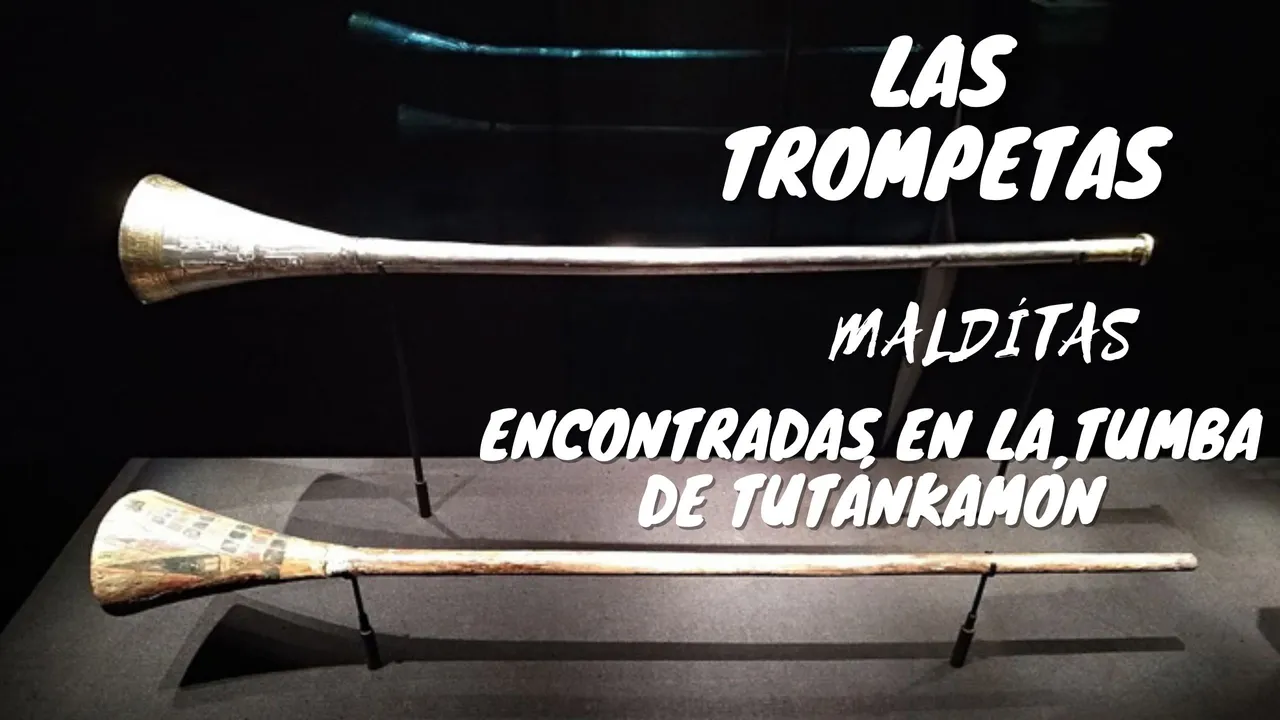
Image designed by me in canva editor
Hola mis queridos amigos, aquí estoy de nuevo con uno de los temas que más me fascina investigar, la egiptología. En una ocasión les mostré algo de los maravillosos tesoros hallados en la tumba más famosa del mundo, sí, la tumba de Tutankamón, también conocido como «El Niño Rey», pero en esta oportunidad quiero que conozcan un par de objetos hallados que fueron considerados «malditos» debido a los acontecimientos que supuestamente provocaron, así que sin más preámbulo, acompáñenme en esta aventura arqueológica.
Hello my dear friends, here I'm again with one of the subjects that fascinates me the most, Egyptology. On one occasion I showed you some of the wonderful treasures found in the most famous tomb in the world, yes, the tomb of Tutankhamun, also known as "The Boy King", but this time I want you to know a couple of objects found that were considered "cursed" due to the events they supposedly provoked, so without further ado, join me in this archaeological adventure.

El 26 de noviembre de 1922 el egiptólogo británico Howard Carter encontró una segunda puerta en la tumba KV62, mejor conocida como La Tumba de Tutankamón, al estar sellada no pudo abrirla, entonces comenzó a hacer un agujero con una barra de hierro en el sello, posteriormente acercó una vela y se dispuso a mirar a través del agujero, fue en ese momento cuando surgió la famosa pregunta de su mecenas, Lord Carnavon: «¿Puedes ver algo?» y la no menos famosa respuesta de Carter: «Sí, cosas maravillosas»
On 26 November 1922, the British Egyptologist Howard Carter found a second door in the tomb KV62, better known as the Tomb of Tutankhamun. As it was sealed, he could not open it, so he began to make a hole with an iron bar in the seal, then he put a candle close to it and started to look through the hole. It was at this point that the famous question from his patron, Lord Carnavon, came up: "Can you see anything?" and Carter's no less famous answer: "Yes, wonderful things".
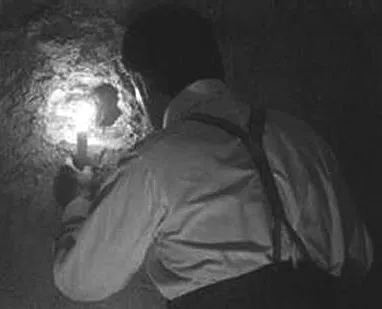
Carter estaba maravillado porque, como arqueólogo y egiptólogo sabía que estaba ante un gran descubrimiento. Luego de que el polvo se disipó, él pudo ver muchos objetos al otro lado de la puerta, tesoros grandiosos y espectaculares. Tiempo después estos objetos fueron inventariados y debidamente trasladados a un museo, pero en años posteriores, un par de ellos que formaban parte de las «cosas maravillosas» del Niño Rey, comenzaron a causar ciertos problemas.
Carter was amazed because, as an archaeologist and Egyptologist, he knew he was on to a great discovery. After the dust cleared, he could see many objects on the other side of the door, great and spectacular treasures. Later these objects were inventoried and duly transferred to a museum, but in later years, a couple of them that were part of the " wonderful things " of the Child King, started to cause some problems.
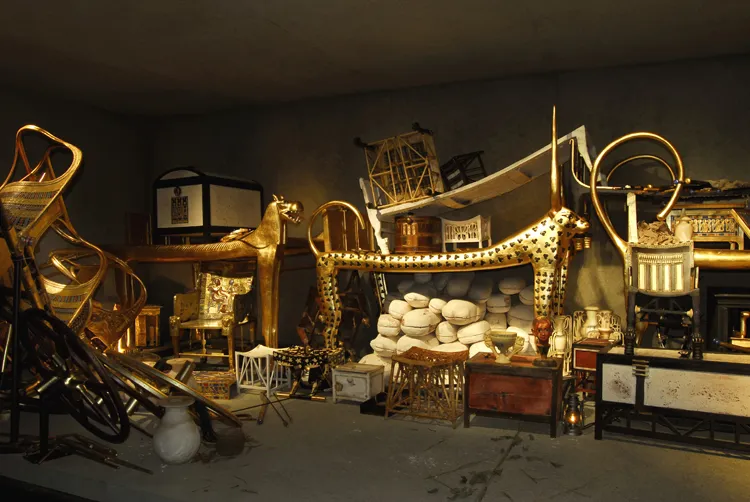
Las Trompetas malditas
The cursed trumpets
Estas trompetas formaban parte del ajuar funerario de Tutankamón, estaban hechas de plata, bronce y madera, y al momento de ser encontradas por Howard Carter estaban dentro de uno de los sarcófagos de la momia.
These trumpets were part of Tutankhamun's grave goods, made of silver, bronze and wood, and at the time they were found by Howard Carter they were inside one of the mummy's sarcophagi.
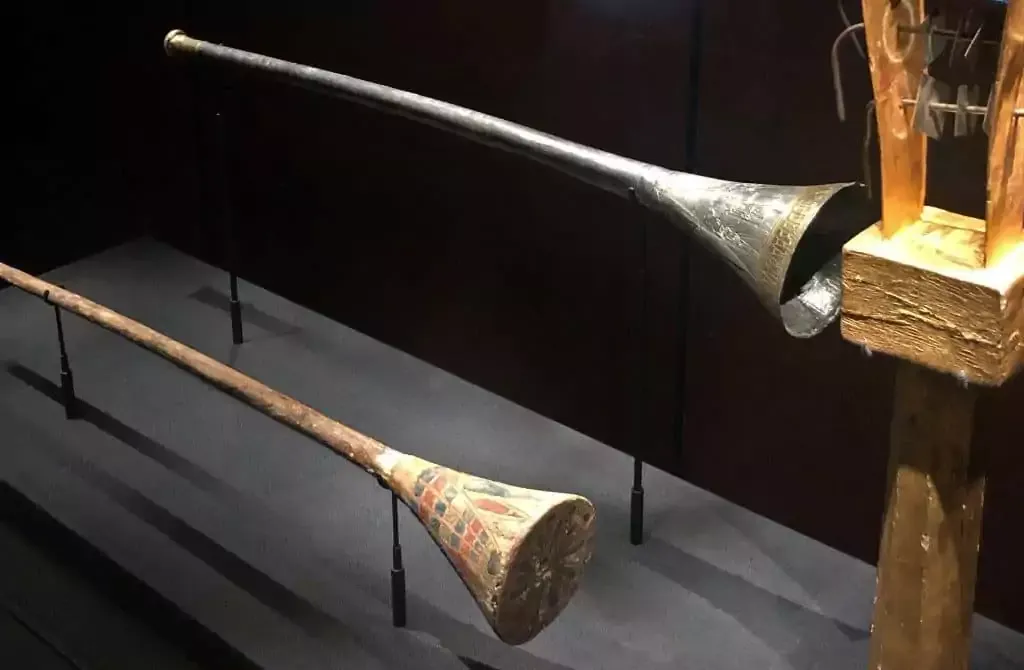
Se dice que todos los que estaban presentes en la excavación de la tumba del faraón murieron a causa de una terrible maldición, aunque hoy en día, según los estudios científicos, se ha demostrado que las muertes ocurrieron por causa de unas peligrosas esporas que se hallaban en el interior de la tumba que estuvo sellada por miles de años, sin embargo también se cuenta que algunos de los objetos allí encontrados, como este par de trompetas, resultaron igualmente perjudiciales, ya que cada vez que una de las dos suena, al poco tiempo estalla una guerra.
It's said that all those present at the excavation of the Pharaoh's tomb died because of a terrible curse, although today, according to scientific studies, it has been proven that the deaths were caused by dangerous spores that were found inside the tomb, which was sealed for thousands of years. However, it's also said that some of the objects found there, such as this pair of trumpets, were equally harmful, since every time one of them sounds, a war breaks out soon after.
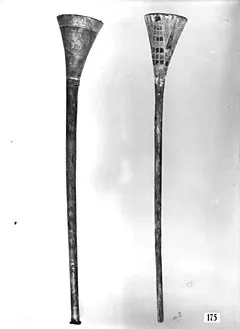
En el año 1939, la BBC convenció al Servicio de Antigüedades Egipcio para que transmitieran en vivo el sonido de estas trompetas, a través de un programa de radio conducido por el famoso presentador de la época, Rex Keating.
In 1939, the BBC persuaded the Egyptian Antiquities Authority to broadcast the sound of these trumpets live on a radio programme hosted by the famous presenter of the time, Rex Keating.
Todo iba perfecto esa noche, incluso tenían como invitado a uno de los sobrevivientes de la «terrible maldición del faraón», Alfred Lucas, quien estuvo presente en la excavación. El talentoso músico James Tappern también fue invitado para la ocasión, así que, llegado el momento, tomó una de las trompetas, la llevó a sus labios y una melodiosa y misteriosa música comenzó a escucharse enseguida.
Everything was going perfectly that night, they even had as a guest one of the survivors of the "terrible curse of the pharaoh", Alfred Lucas, who was present at the excavation. The talented musician James Tappern was also invited for the occasion, so, when the time came, he took one of the trumpets, brought it to his lips and a melodious and mysterious music began to play at once.
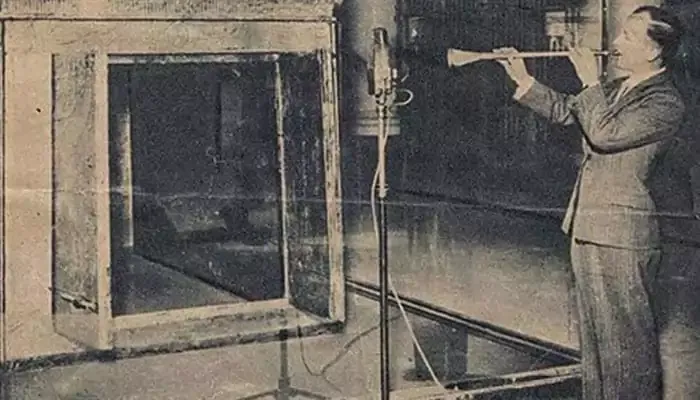
El sonido de la trompeta quedó registrado en esta única grabación que existe al respecto.
The sound of the trumpet is recorded in this unique recording.
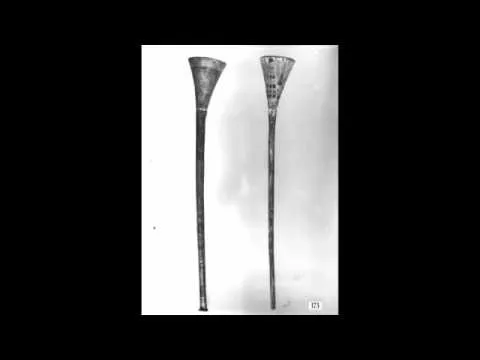
Cinco minutos después, la ciudad de El Cairo quedó completamente a oscuras a causa de un repentino apagón, e incluso, el presentador Rex Keating, tuvo que continuar la transmisión alumbrándose con velas, pero lo más impresionante ocurrió posteriormente, ya que cinco meses después, coincidencia o no, estalló la segunda guerra mundial.
Five minutes later, the city of Cairo was completely in darkness due to a sudden blackout, and even the presenter, Rex Keating, had to continue the broadcast by candlelight, but the most impressive thing happened later, because five months later, coincidence or not, the Second World War broke out.
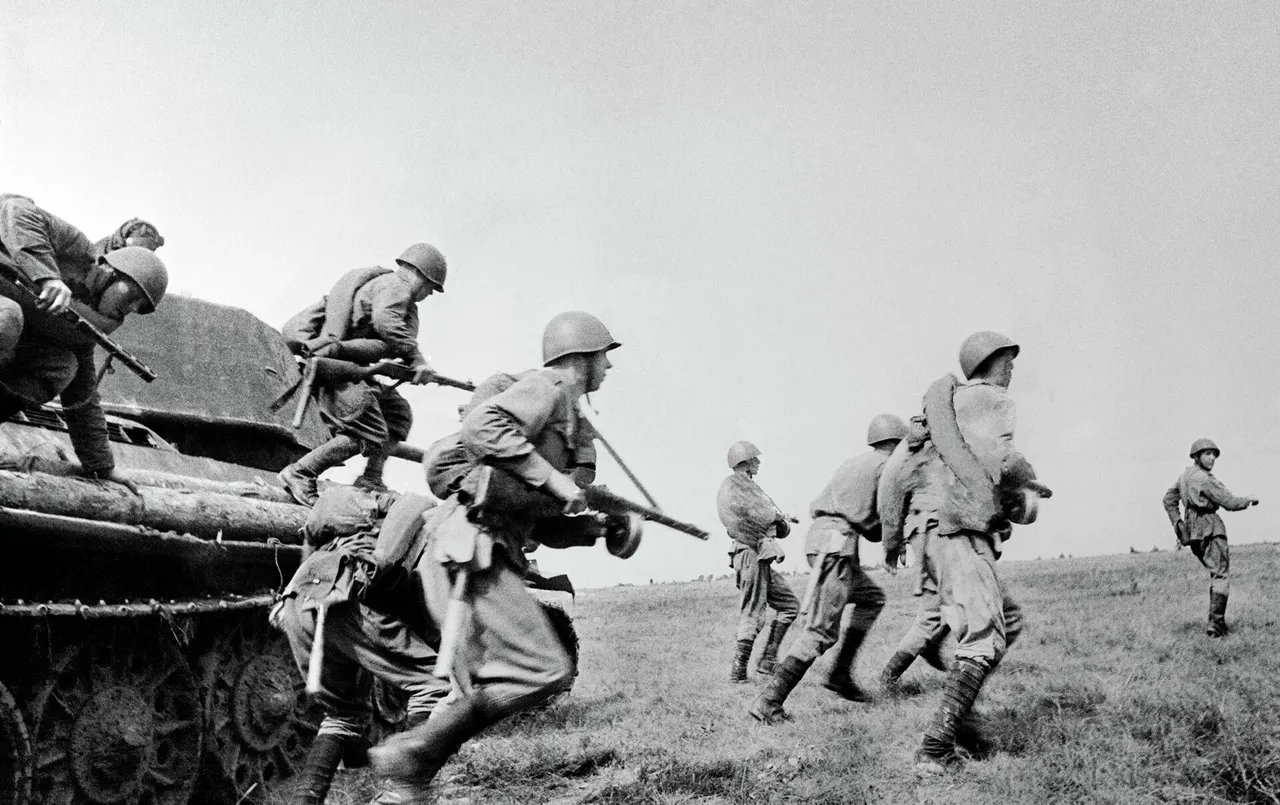
Pudo haber sido una coincidencia y ciertamente en ese momento no se asoció el hecho con el sonido de las trompetas, sin embargo, 28 años después, específicamente en el año 1967, un estudiante de arqueología que se encontraba examinando las trompetas, decidió tocar una de ellas y poco tiempo después estalló la guerra Árabe- Israelí, también llamada «La Guerra de los seis días», cuando Israel invade Egipto
It may have been a coincidence and certainly at the time was not associated with the sounding of the trumpets, however, 28 years later, specifically in 1967, an archaeology student who was examining the trumpets decided to blow one of them and shortly after the Arab-Israeli war broke out, also called the "Six Day War", when Israel invaded Egypt.
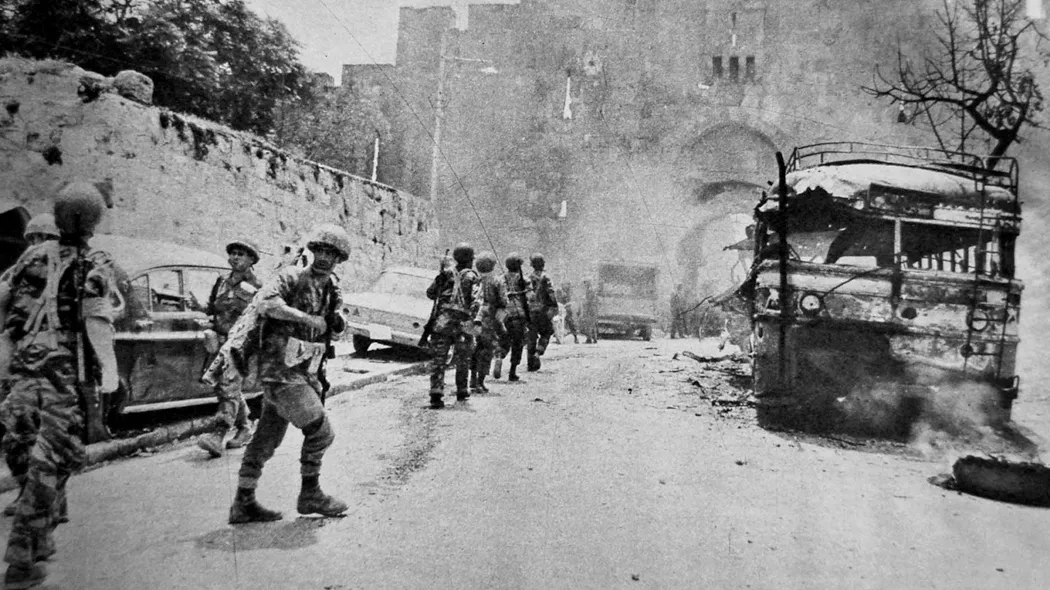
En 1991 las trompetas volvieron a sonar (se desconoce quien se atrevió a tocarlas) y entonces surgió «La guerra del Golfo», pero como si no fuese suficiente en el año 2011, otra vez sin saber quien fue el causante volvieron a sonar y el 25 de enero de ese mismo año ocurrió el levantamiento de Egipto contra su presidente Hosni Mubarak
In 1991 the trumpets sounded again (it's not known who dared to blow them) and then came "The Gulf War", but as if it was not enough in 2011, again without knowing who was the cause, they sounded again and on January 25th of the same year there was an uprising in Egypt against its president Hosni Mubarak.
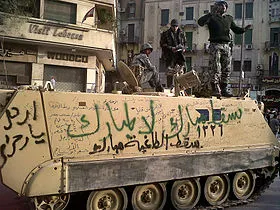
Luego de todo esto, unos años después ambas trompetas fueron robadas, junto con una estatuilla que también formaba parte de los tesoros de Tutankamón, sin embargo, pocos días después, los objetos fueron abandonados en una estación de metro. Nadie sabe quien los robó, pero sea quien haya sido, probablemente experimentó en carne propia, la supuesta maldición.
After all this, a few years later both trumpets were stolen, along with a statuette that was also part of Tutankhamun's treasures, but a few days later, the objects were abandoned in a metro station. No one knows who stole them, but whoever it was, they probably experienced the alleged curse first hand.
Según análisis arqueológicos posteriores, estas trompetas eran usadas por El faraón para convocar a su ejército, es decir, eran trompetas de guerra, entonces surge la pregunta obligatoria ¿realmente es solo una coincidencia? aunque yo también haría una segunda pregunta ¿Habrá alguien tocado alguna de estas trompetas este año 2022? ciertamente que no podemos negar que todavía hay mucho misticismo en torno a todo lo que rodea el antiguo Egipto.
According to later archaeological analysis, these trumpets were used by the Pharaoh to summon his army, that is to say, they were war trumpets, so the obligatory question arises, is't really just a coincidence? although I would also ask a second question, has anyone blown any of these trumpets this year 2022? certainly we cannot deny that there is still a lot of mysticism surrounding everything that surrounds ancient Egypt.

Amigos muchas gracias por toda su atención, espero que les haya gustado este post, nos vemos en una próxima oportunidad.
Friends thank you very much for all your attention, I hope you liked this post, see you next time.

Image designed by me in canva editor
A continucaión les dejaré el link que los conducirá al sitio web en el que encontré información valiosa para la realización de este post.
Below is the link to the website where I found valuable information for this post.